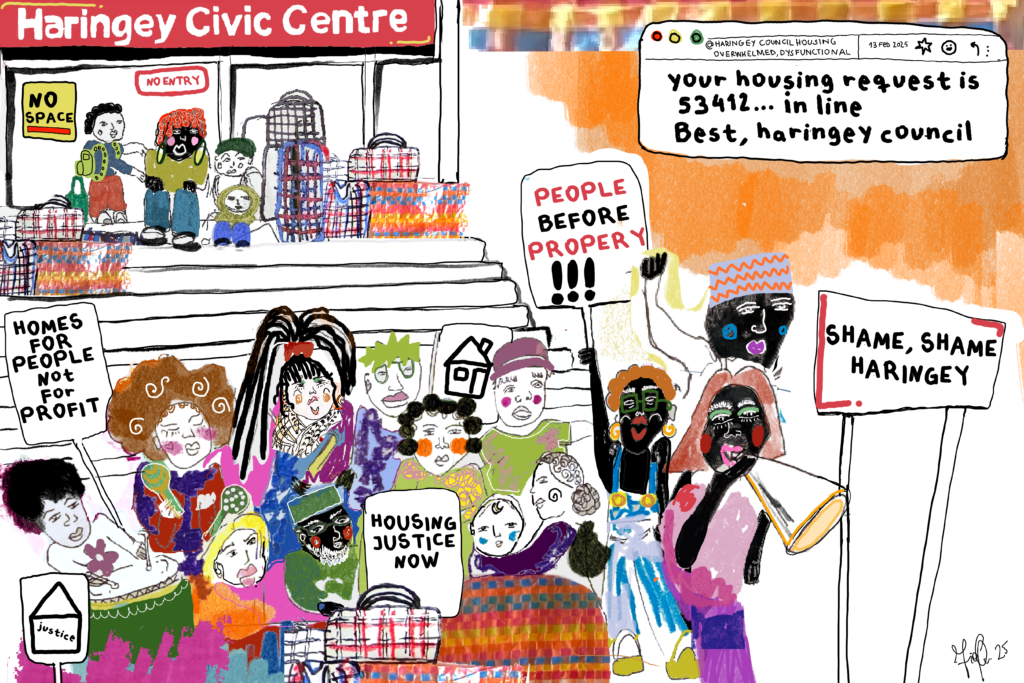reflections

This week I read a recent article by Julia Dagg which explores how vulnerable people who have fled abuse are often housed in poor-quality ‘temporary’ accommodation by British councils, sometimes for years on end, creating a cycle of trauma and precarity.
To me, it highlights how the marketisation of housing is not only socially damaging, but actively reinforces existing power structures, preventing people from breaking out of domestic violence.
cycles of victimisation
Layla’s story, which Julia tells in the piece, illustrates this vicious cycle. Layla bravely fled physical and emotional abuse, only to be stuck in housing limbo by Haringey council for two and a half years. It’s both heart-breaking and illustrative of a systemic problem. The cramped and squalid conditions that victims of abuse are made to suffer signifies their worth in the society we have created.
Councils have a responsibility to assist people who are unhoused or temporarily housed to find proper, suitable accommodation. Four family members to one room is not suitable, or indeed liveable. And for abuse victims like Layla, sharing communal spaces like bathrooms with strangers, especially men, is particularly distressing.
It is also a fact that women are disproportionately affected by homelessness. What does this tell us?
marx was right
Capitalism inherently produces inequality, meaning those who are exploited – the working-class, racialised people, other minority groups – are kept in their place through systems of oppression. These systems ensure the rich keep exploiting, and the poor keep producing wealth for them. This applies to many sectors: labour, education, justice, and certainly housing.
That is why women and other marginalised groups like trans people are more likely to experience homelessness, and are also more vulnerable to abuse. This creates a cycle of exploitation which is hard to break out of. Terrible housing can be a hotbed for further emotional or physical stress, and the reliving of past traumas.
As Hannah Bradburn of legal aid firm Lawstop explains when interviewed in the piece, “Women are not only more likely to be homeless because of abuse – women and queer people are also more likely to experience violence and abuse when they are homeless. When unhoused, there is a high risk of re-traumatisation or even reabuse”.
thatcher was wrong (shocker)
As Julia discusses, a lot of the UK-specific issues with housing stems from our lack of social housing. And you know where that originates – Maggie Thatcher, the milk snatcher. Britain’s arch-villain. I mean, who else could it be?
Thatcher fundamentally altered British society with the introduction of Right to Buy, which saw thousands of social homes sold off to private landlords and developers. The crisis deepened as councils demolished old social housing without replacing them at the same rate, plus the responsibility for building new stock was increasingly outsourced to private companies. This means councils now pay rent to private companies to house people in temporary accommodation. In other words, “billions of pounds in public money are transferred to private landlords each year.”
This outsourcing of one of the core functions of councils has made us all worse off and offers no decent solution to the housing crisis. It should be criminal that endless, unfit temporary accommodation, as in Layla’s situation, have become more commonplace, especially in London.
The system reinforces itself, like the snake eating its own tail. Unless we strive to break this damaging cycle. Renters’ unions are a way of collectively challenging the monumental power of landlords in this country and beyond. But we also need more solutions to deprive private companies of the power they hold in the housing sector, instead shifting to community-led efforts of building affordable, safe homes.
We need more ways to challenge this backwards system. It’s crucial to imagining a fairer society, which values the experiences of humans like Layla over profit.
~ Tommy
one thing to watch:
Harland Spinks – The Alt-Right are Dressing like the Radical Left
I’d never heard of this YouTuber, but he is catty and hilarious, making great points in this video about the role of fashion in representing different political leanings. The discourse around this originated when people were alarmed to see MAGA conservatives in the US dressing like modern hipsters or even – gasp – the left, during a debate against progressive Sam Seder that went viral.
But Harland shows how this is not the right becoming cool, but rather following a tradition of co-opting fashion trends as a way of trying to make their problematic ideas more palatable. It stems from a lack of creativity and originality in thought, which is reflected in their fashion sense, leading to poor (and belated) imitations of popular trends such as little moustaches, cute glasses and floppy hair. Worth checking this out!
one thing to groove to:
I’m a massive fan of AIGEL, a Russian electronic/hip-hop duo. The singer Aigel Gaisina is a poet who sings alternately in Russian and Tatar, weaving her cultural heritage into the music, bringing attention to the minority language of the Indigenous community of Tatarstan in Russia.
The duo was blacklisted by the Kremlin for their vocal opposition to Russia’s invasion of Ukraine, now residing in other parts of Europe. I saw them recently in London and they were amazing live! Aigel’s voice penetrates the often driving and pulsating electronic beats of producer Ilya Baramiya, and they work so well together.
This song (‘sneg’ means ‘snow’) remains one of my favourites of theirs. There’s something very ominous and dark about it, especially evident in the lyrics (“What is under the snow? Do you want to know?”).
one thing to listen to:
Trans people have always existed and will always exist. The only thing ‘up for debate’ is how we treat people, and the so-called gender criticals are winning, with the UK supreme court’s new ruling that the legal definition of a woman is based on biological sex creating further anguish for our trans brothers and sisters.
I found this episode of Queer Collective Podcast to be a fun and digestible chronology of trans people, and a thought-provoking look into how different cultures throughout history have considered concepts of gender and those who don’t conform to established norms. Why not send this to that vague acquaintance you somehow still follow on Twitter who stans J.K Rowling?
one thing to read:
…. Subscribe HERE for full free post.

